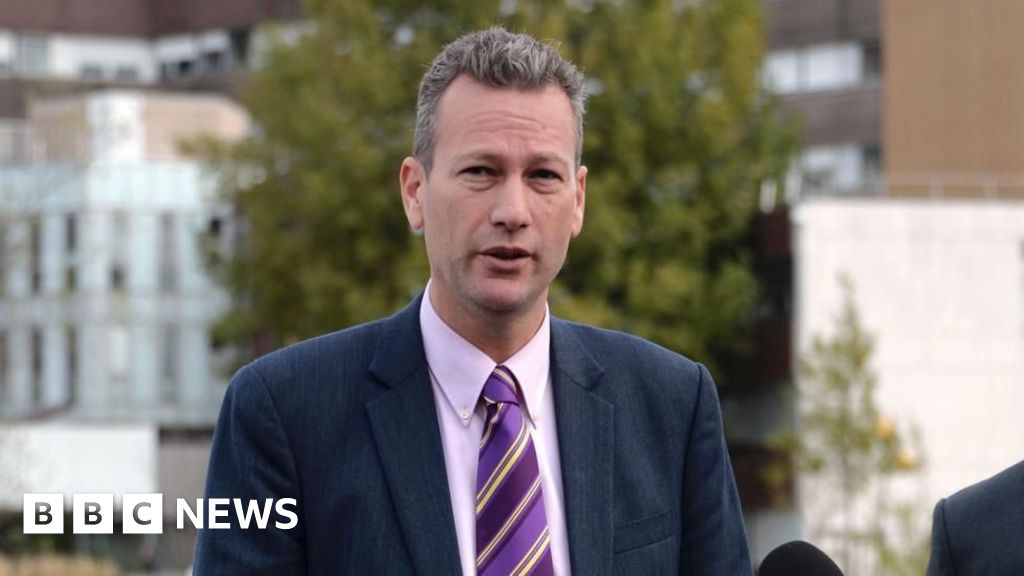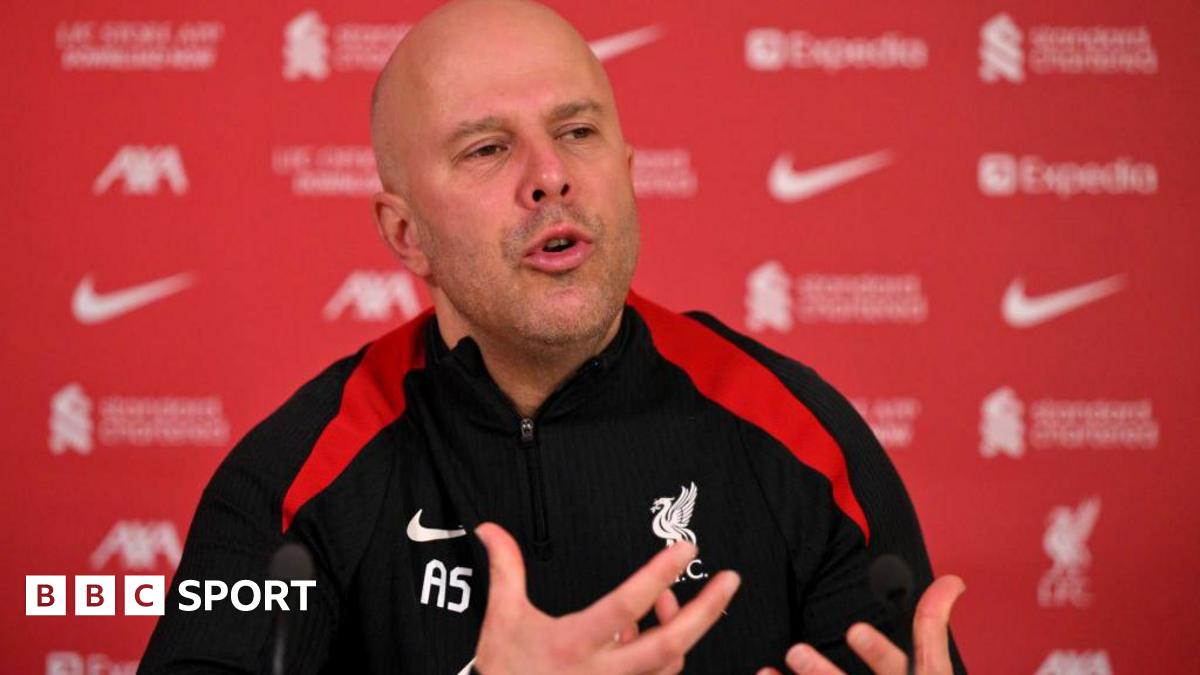11 minutes ago
By Michael Buchanan and Katie Inman, BBC News

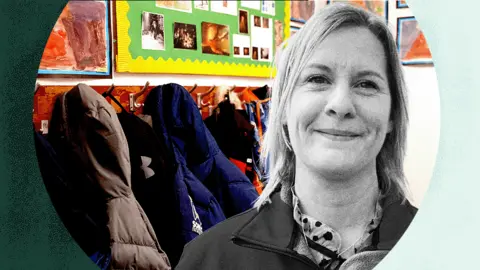 BBC
BBC
Michelle Skidmore is the 14th headteacher at Lantern Academy since 2016
Schools across the UK are under unprecedented pressure as they struggle to address a range of social issues unrelated to teaching. A group of schools in the West Midlands town of Telford illustrate the problems. Here, for a growing number of pupils, simply getting to school is an achievement in itself.
It is lunchtime and a handful of pupils at Lantern Academy, a Telford primary school, are playing indoors even though the sun is out. As headteacher Michelle Skidmore approaches, they begin to gather their coats.
“Are you heading out?” she asks. A five-year-old boy responds. It is not clear what he is saying, and Ms Skidmore tries to help. He repeats himself, four times in total, before she figures out that a family member of his has gone to hospital. He runs outside.
“We have a number of children who struggle with basic communication,” says Ms Skidmore. “'Can I go to the toilet? Can I have a drink?’ These are some of the basic sentences we have to teach our children to say.”
The children, whose parents speak English at home and have no learning disabilities, are coming to school unable to communicate. The staff therefore have to teach them Makaton, a basic form of sign language that uses symbols and signs to allow them to express themselves.
Some of the children who cannot talk are not toilet-trained either. At the start of Reception in September, eight of the 27 four-year-olds came to school in nappies. The school has had to develop “intimate care plans” to keep them clean as well as providing potty training.

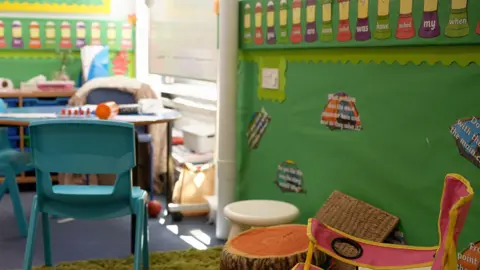
Forty-eight per cent of pupils at Lantern Academy receive free school meals - about double the England average
One mother says her son was late reaching all his milestones, and had no interest in learning to use a potty before going to school.
“He wasn’t ready,” she says. “So when we felt he was, the school really helped with that.”
A child in Year 1 is still not toilet-trained at six-years-old.
Michelle Skidmore is the 14th headteacher at the school since 2016. The high staff turnover reflects the challenges the school has faced in recent years.
Polling suggests that most people think public services have deteriorated nationally in recent years. This article is the first of three focusing on the town of Telford, which a BBC News analysis has identified as facing particular challenges across its courts, schools and health services. Similar problems to those found in Telford are widespread, however.
Situated in one of the most deprived areas of Telford, Lantern Academy was known as Queenswood Primary when it was run by the local authority, and rated as “Requires Improvement” by Ofsted. It was renamed to give it a fresh start when it joined a local multi-academy trust, the Learning Community Trust, two years ago.
Forty-eight per cent of pupils receive free school meals - about double the England average. But the new ethos that Ms Skidmore has worked hard to create is being severely tested by challenges resulting from the Covid pandemic. “For some people, the role of parenting has changed - 100%,” she says.
Educational experts and teaching unions say the forced closure of schools during the pandemic meant some families lost sight of the value of education. In some cases, they were too busy working to home school their children, or didn’t have the space. When schools reopened, they placed less importance on ensuring their children attended.
In addition, many schools found that parents’ mental health became strained. And this coincided with the closure of services where people with young children could meet, and receive professional support. Some parents today do not know how to play with their children, the school has discovered, so it now runs a weekly class to teach them.
“I keep going back to that competition element - my child’s walking, my child’s no longer in nappies - those milestone moments, they’ve gone now because those parent and toddler groups, where you’d see all that, have gone,” Ms Skidmore says.
Parents at Lantern Academy also sometimes struggle to keep their children healthy. School welfare officers now sometimes accompany them to doctors’ appointments, at the parents’ request, so they can be confident of fully understanding the medical advice.
Children’s mental health has also become an ever greater challenge since the pandemic, and it is the key driver behind the biggest problem faced by all the schools in the trust - attendance.
The trust has 7,000 pupils on its books across 13 schools - five primary, five secondary, two special schools and a pupil referral unit. At any time about 700 pupils, 10% of the total, are being looked after by a team of welfare officers employed to support teachers and families to get through the school year.

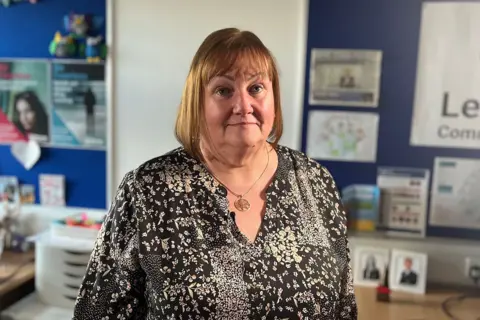
Mental health and the cost of living crisis are complex challenges for parents and children, says school welfare officer Nikki Morrison
“When we're digging into the background problems now, we're noticing that things are getting more complex for a lot of children and families,” says Nikki Morrison, a school welfare officer for 20 years, who leads a team of eight.
“We’ve higher rates of parental mental health issues, we've got the cost of living crisis, we've got children who are on waiting lists to be assessed for autism and ADHD, who are quite clearly struggling in the educational environment that they've been placed in, because it's not the right environment for them.”
For the past two years, Ms Morrison has been working with Harley. The 15-year-old suffers from severe anxiety and has not attended a full day at his school since April 2023.
“Most of the struggle is leaving the house,” he says. “It's not just for school, it's to go anywhere.” Harley, who says he studies history and maths at home, is fully aware that his lack of attendance is harming his future. But despite Ms Morrison’s efforts – which included getting him a place at one point at a special school with a handful of other pupils - Harley still is not able to engage with education.
His anxiety, he says, was a problem in primary school but the pandemic exacerbated it. “I missed most of Year 6 and Year 7 because of the pandemic, but I also missed having transition days into secondary school, meaning that when I actually started secondary, it was a lot more difficult for me because it was a place I was unfamiliar with.”

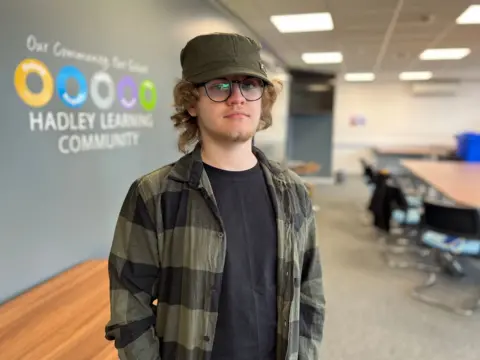
Harley says missing transition days made starting secondary school more difficult
At Charlton School, a Learning Community Trust secondary school with more than 1,200 pupils in the north-east of Telford, attendance is 92%, on a par with the England average of 93%, but down from the 95% typically seen pre-Covid.
That headline figure masks a greater problem. The number of pupils classed as persistently absent - who attend less than 90% of the time - is 22%. That is close to the current England average rate of 21%, but double the pre-pandemic England average.
In order to encourage students into classes, the school is having to take a range of unusual steps.
Some pupils can only make it into the car park, where they are met by a teacher or welfare officer, and then allowed to return home if they cannot face coming in. Others make it to reception but no further.
For those who can get beyond the threshold, there are limited timetables - sometimes just two-to-three hours per day - or a forest school, where pupils learn bushcraft skills in the school grounds. Other students are taken to a local zoo and encouraged to learn about the animals and how to care for them.

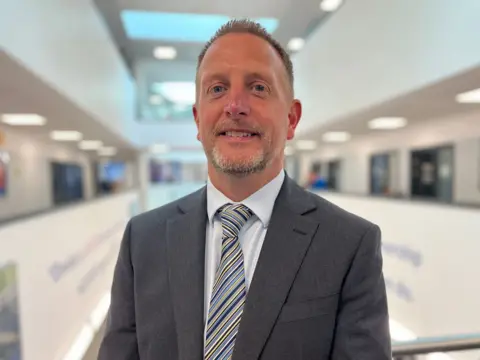
Just getting some children through the school gates each morning can be a challenge, says headteacher Andrew McNaughton
“Our primary focus in this school is providing education,” says headteacher Andrew McNaughton. “Unfortunately, for many students, we have to do a big piece of work to enable them to be able to access that. The challenges have increased. For us to be able to put the support in place for students just to simply be able to come through the doors can be a challenge.”
The Charlton School has access to Nikki Morrison’s team of welfare officers, but also has seven of its own. A key problem they face is the increasing number of students who are presenting with ADHD or autism, or other neurodivergent conditions.
According to Andrew McNaughton those children can wait more than two years for a formal diagnosis. “If we send them for an assessment in Year 9, they’ll probably have left the school by the time they get diagnosed,” he says.
Adding to the school’s concerns is that Shropshire Beam, an emotional health and wellbeing service where young people could get drop-in support, closed at the end of April, as its funding ended.
Many of those students therefore end up with the welfare team. Nikki Morrison is always optimistic that her staff can find solutions - she has even cajoled her husband into helping, getting him trained to be an exam invigilator so he can supervise students sitting GCSEs at home. But she wonders what will happen to these students when they get older.
“If we haven't brought children through the system who are resilient and ready for the next level, who's going to pick this group up - young people who’ve spent most of the last five or six years sporadically in and out of education, or having a bespoke timetable where they've been away from their peers and they've become quite socially isolated?
“Somebody is going to have to pick up that group when they leave school and try to put in the support to enable them to be productive and functional members of society.”
Additional reporting by Daniel Wainwright and Callum Thomson

 9 months ago
53
9 months ago
53


